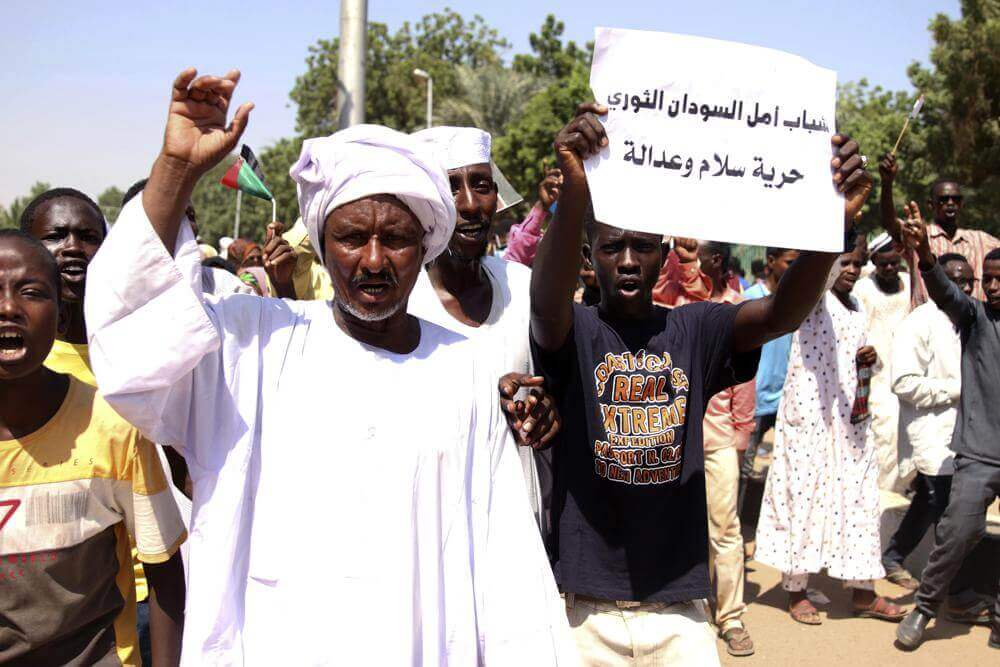Thousands of Sudanese protestors took to the streets of Khartoum on Saturday to demand the dissolution of the joint military-civilian transitional government and call for a military takeover of the country. The protests come as Sudan faces a major political crisis following a failed coup attempt by several military leaders last month.
The National Accord Group, a faction of the civilian Forces for Freedom and Change (FFC) that supports the military, organised the demonstrations in front of the presidential palace. It noted that the protests would continue until the dissolution of the transitional government led by Prime Minister Abdalla Hamdok.
The protestors praised Gen. Abdel Fattah Al-Burhan, the head of the military and its ruling sovereign council, and urged him to overthrow the government and initiate a military takeover. Protestors chanted slogans like “One People, one army” and “down with the hunger government.”
While minor clashes were reported between the demonstrators and pro-civilian government supporters, there were no major incidents of violence or riots.
The protestors’ demands reflect the statement made by Al-Burhan last week calling for a dissolution of the joint government in order to resolve the ongoing political crisis. Burhan said it was necessary to form a Legislative Council representing all people. He added that such a council should be chosen by the people through elections. Accordingly, he called for the dissolution of the government.
Moreover, Al-Burhan blamed the civilian government for trying to exclude the military from the transitional process. He also accused it of trying to influence public opinion by creating problems with the armed forces and refusing dialogue. These actions would cause problems that could negatively affect the transition process, Al-Burhan asserted.
His comments come as civilian authorities continue to blame the military for last month’s failed coup attempt. Civilian leaders and groups have held the military responsible “for the failure to handle the growing insecurity in the country and prevent repeated coup attempts.”
In September, Sudanese authorities foiled an attempted coup by plotters loyal to ousted President Omar Al-Bashir. Officials arrested 21 military leaders and many soldiers for plotting the ouster of the civilian government. Since 2019, there have been several plots to topple the transitional government, but they were all foiled before they could be executed.
PM Hamdok said while the “failed coup attempt on 21 September was supposed to turn from a threat to an opportunity, to alert to everyone to the dangers threatening our country,” it has instead led to “hidden differences and accusations from all sides” and put “our revolution in jeopardy,” referring to the protests that led to the toppling of Bashir from power.
Moreover, a day before the protests, Hamdok laid out a roadmap to end the country’s “worst and most dangerous” political crisis in its two year transition. He said the plan included efforts to form a transitional legislature, undertake military reforms, and increase political participation.
His plans were praised by United States (US) Secretary of State Antony Blinken, who said the US “welcomes Hamdok’s leadership in laying out a roadmap of principles to sustain the democratic transition in Sudan.” Blinken also called on “all stakeholders to take immediate, concrete steps” to smoothen the transition process.
The civilian-military transitional government was established in 2019 following the ouster of longtime dictator Bashir in a military coup after large-scale protests demanding his removal. Following Bashir’s removal, the military signed a power-sharing agreement with the civilian Forces of Freedom and Change coalition. The transitional government is tasked with dismantling the Bashir-era political and financial framework and easing the path towards democratic transition.

